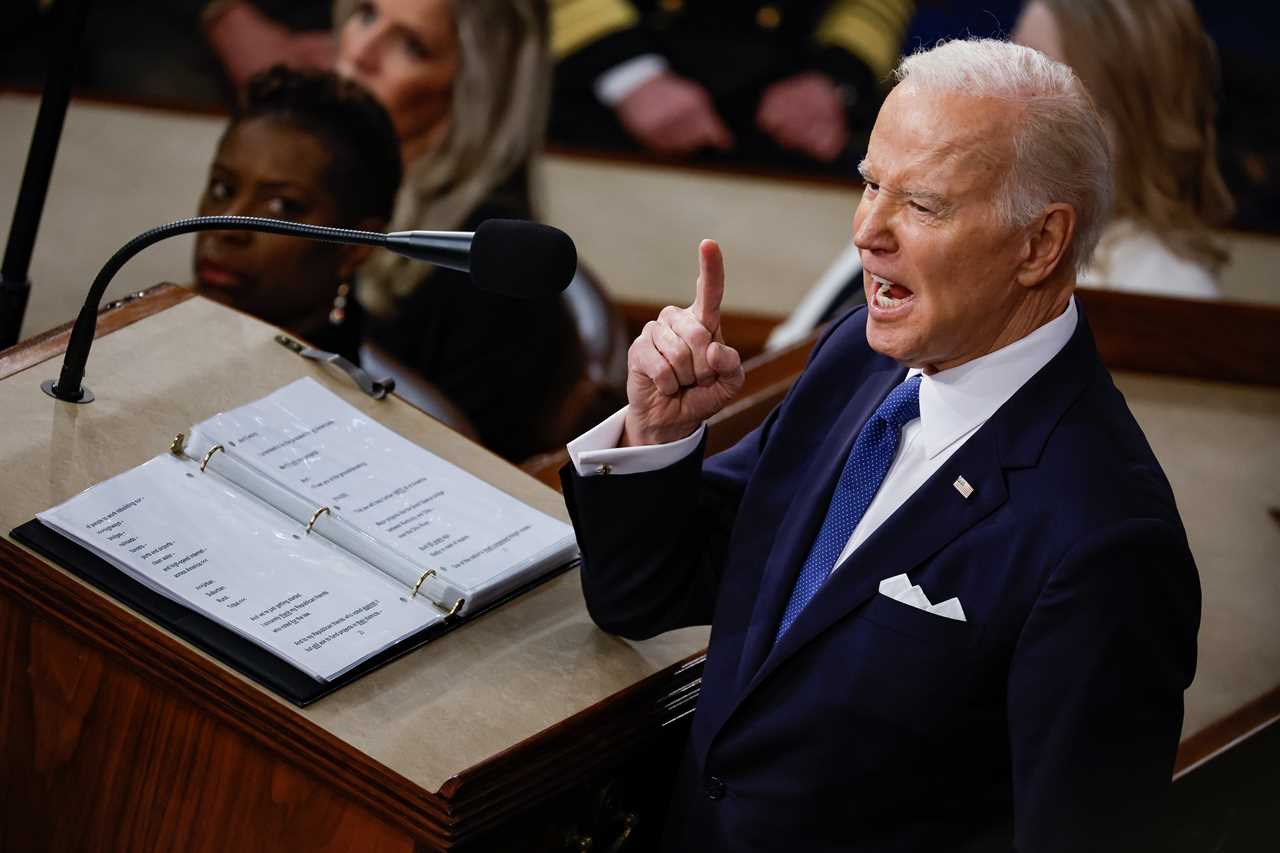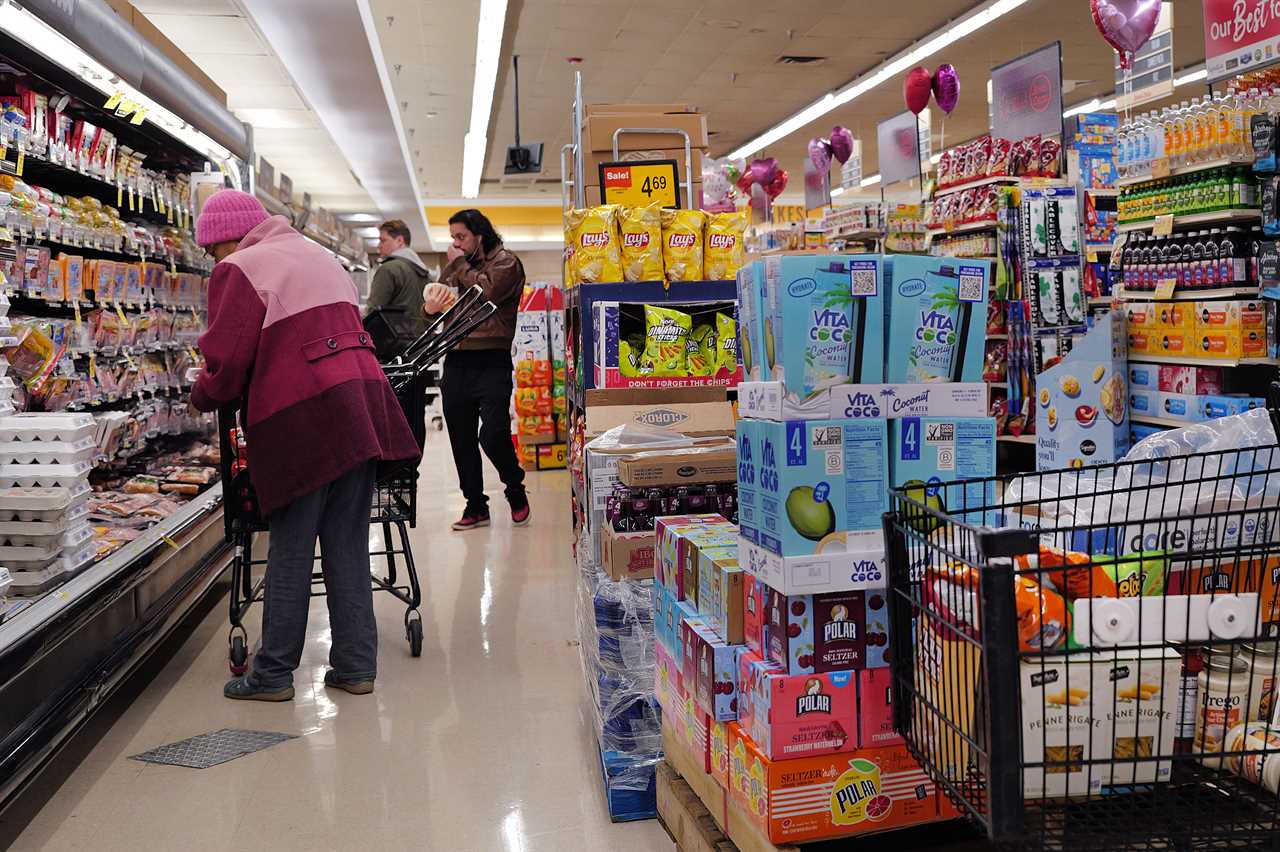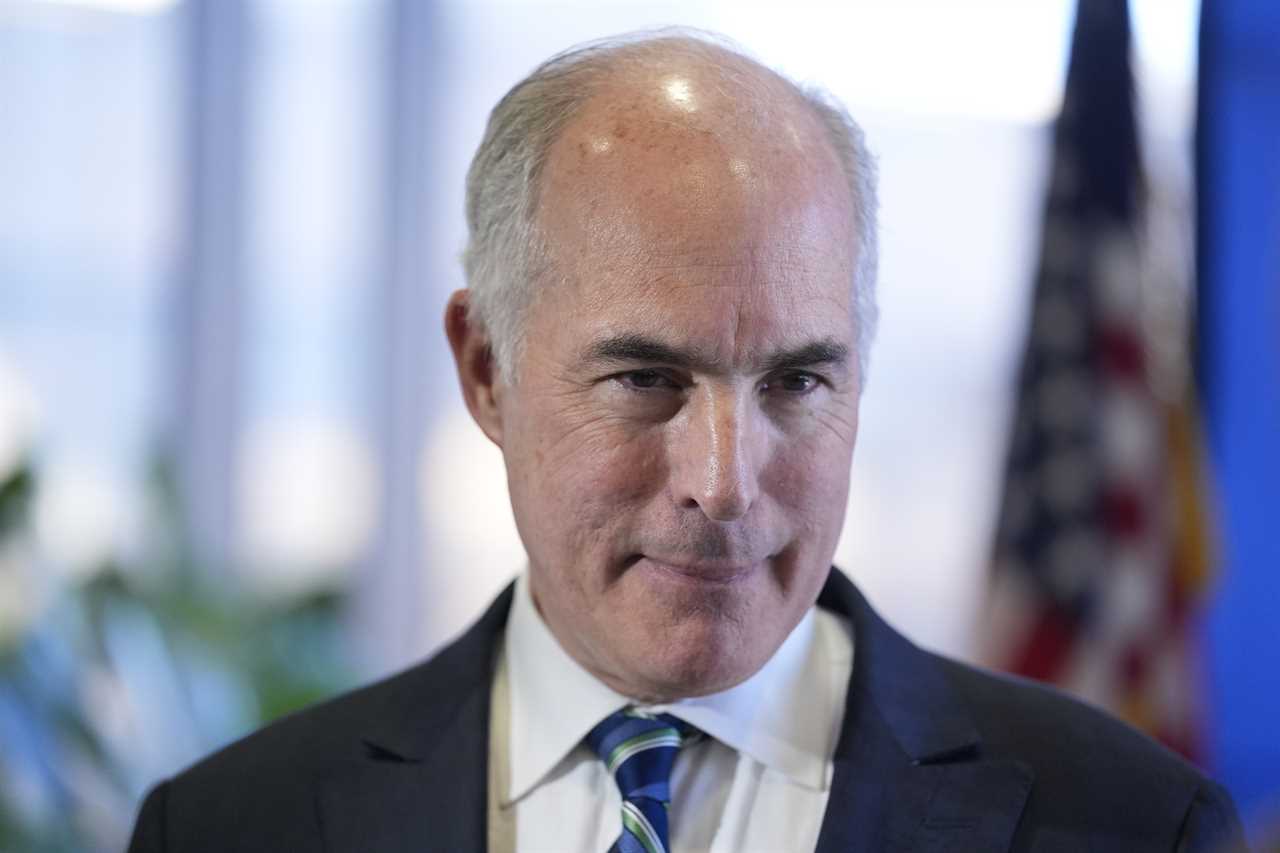
President Joe Biden is weighing how hard to hammer big food companies over painfully high grocery prices in his upcoming State of the Union Address. But some some aides remain wary of focusing too much on food inflation, given how little power the president has to singlehandedly force down prices.
Biden embraced the concept of “shrinkflation” in a Super Bowl message targeting major snack food corporations — as the president framed it, there are now “fewer chips” in your bag, while companies are “still charging you just as much.”
And the White House has been aggressively testing out the messaging on the airwaves and in internal polling ahead of Biden’s speech, according to two White House officials familiar with the matter, who were not authorized to speak on the issue and were granted anonymity to discuss internal conversations. Recent polling circulated within the White House has been favorable to Biden’s push to blast what he’s described on the campaign trail as “corporate greed” driving higher prices across a range of sectors.
The most recent drafts of Biden's State of the Union address have included a reference to shrinkflation as part of a broader segment on administration efforts to pressure companies to lower costs across the board, a third White House official said, though the speech is not yet finalized and could still change.
“It’s about framing this for the American people,” said the official, who was granted anonymity to discuss internal deliberations. Biden’s open frustration with tactics like shrinkflation, the official added, “speaks to what they feel in a way that’s useful for us both in terms of messaging and making sure they understand that the president sees what’s going on.”
The White House in recent weeks has sought new ways to neutralize concerns over grocery costs, a major factor dragging down voters’ otherwise improving views of the economy. Officials are keen to push back on the GOP emphasis on high food prices, and Biden has personally taken issue with the practice of shrinkflation — though some officials still question how much attention the president should devote to food inflation, specifically.
Biden has periodically assailed corporations for driving up consumer prices throughout his term as a way to redirect voter anger over costs and reinforce his populist credentials. The president targeted oil companies over a surge in gas prices in 2022, and more recently has accused companies of "price gouging" for failing to lower prices even as they pull in larger profits.
Republicans are highly critical of those White House claims, arguing it’s Biden’s policies that are fueling inflation, not corporations jacking up prices. And even some Democratic economists remain skeptical about how much of the price increases can be pinned on so-called “greedflation.”
"Costs have gone up — wages are 20 percent higher than they were in 2019," said Dean Baker, a senior economist at the progressive Center for Economic and Policy Research. "We're not going to have a world where people get to keep their 20 percent pay increases and pay what they did four years ago for food."

Biden, however, likes the “greedflation” and “shrinkflation” arguments, an interest sparked most recently conversations with Sen. Bob Casey (D-Pa.) during a January trip to Allentown, Pennsylvania, according to three other people familiar with the matter, who were also granted anonymity to discuss private conversations. Biden and Casey have also discussed the topic on the phone several times, both before and after the Pennsylvania trip. The president sees the ideas as a relatable way to acknowledge and explain the lingering financial pressures on Americans, even as inflation is falling and prices for some food staples are moderating.
The White House declined to comment on the specifics of its planning for the State of the Union. But spokesperson Michael Kikukawa said in a statement that Biden "will continue to call out rip-offs such as shrinkflation, greedflation and price gouging, and for corporations to pass savings on to their customers."
White House officials, backed by key progressive antitrust advocates, have argued major food companies, including big grocery chains, raised their prices during the pandemic, when supply chain snarls and other issues drove up input costs, but have yet to pass savings onto consumers now that costs are falling.
Food prices are primarily shaped by a wide array of external factors, including labor shortages, rising energy prices, Russia’s war in Ukraine and other global disruptions. That leaves the administration with little power beyond the bully pulpit to compel companies to cut their prices — and increasing pressure from that bully pulpit is now their focus.
Biden leaned into the message especially hard during an event with leaders of the powerful Culinary Union in Las Vegas earlier this month.
“We have the best economy in the world. Inflation is coming down,” Biden told the group. But some goods are “still too expensive,” the president continued, adding that he saw “a little bit of corporate greed going on, too, nationwide.”
And since his conversations with Casey last month, Biden has increasingly bashed corporations over “shrinkflation.”
Casey had published a “greedflation” report in December, detailing instances where companies sold smaller versions of their products for the same price.
Biden, who often presses aides to translate complicated concepts into plain language, ordered his senior aides to begin incorporating shrinkflation into its messaging soon thereafter, one of the White House officials said, and develop policy options cracking down on the practice. Since then, he's peppered his speeches with shrinkflation references — at one point last month abruptly asking attendees at a dinner whether they'd "seen that article about the Snickers bars," an apparent reference to a New York Times op-ed on shrinkflation.
Super Bowl Sunday, in turn, struck aides as a prime opportunity to spotlight the types of brands using smaller packaging to hide increases in their unit costs.
Biden has continued to zero in on the food industry in recent weeks, frustrated by stubbornly high grocery prices and their influence on voters’ economic outlook. The urgency in the White House to directly address high grocery prices only increased after the latest inflation data showed a higher-than-expected rise in food inflation, which Republicans were quick to highlight.

But while the White House is studying potential policy options, Biden is not expected to take any immediate unilateral action. The administration is instead likely to support legislative efforts spearheaded by Casey, who along with Sens. Elizabeth Warren (D-Mass.) and Tammy Baldwin (D-Wis.), has a bill to tackle price gouging and other tactics. Casey is also working on a forthcoming bill to specifically address shrinkflation, according to a person familiar with the matter.
Warren, Casey and Baldwin’s legislation is unlikely to garner GOP support to pass this Congress. But it would be a highly notable step for Biden to endorse such a legislative plan, since it would enact significant federal oversight into big companies’ pricing strategies. The legislation would go as far as to require companies to explain large price increases to the SEC during major economic shocks like another pandemic.
Casey told POLITICO that corporations are "trying to pull the wool over our eyes" by shrinking their products without reducing prices. "Anyone on a tight budget sees it every time they go to grocery store," he added.
Senior Biden aides in recent weeks have also closely studied a move by European grocery chain Carrefour to add labels to some products warning that their package size had shrunk even as their prices remained the same. But they’ve not yet settled on a way to replicate the consumer awareness tactic in the U.S.
Administration officials note that Biden has sought to ease the pain of higher grocery prices for the lowest-income Americans by expanding federal food benefits. But those initiatives do not directly lower retail food costs.
Biden’s war against price gouging and his eagerness to blast “corporate greed” is not new. Early on in his presidency, Biden waged a high-profile campaign against consolidation in the food sector amid crippling prices for meat and other grocery staples. Biden and White House officials under Brian Deese, his top economic adviser at the time, led a very public pressure campaign in particular against the four meatpacking companies that dominate the beef sector.
But large packaged food companies and grocers, for their part, have been blindsided by the new White House push and are scrambling to avoid what they say are efforts to scapegoat their industry ahead of the November elections. Food trade groups and lobbyists are scrambling to tamp down the rising pressure and have been working to especially head off any extra heat Biden is looking to focus on their industry during his State of the Union Address.
The Food Industry Association, a national trade association, cautioned earlier this month that the food retail sector still has “intense” competition and operates on a slim margin.
“In the context of food prices, it’s imperative that such discussions are grounded in reality rather than rhetoric,” said Andy Harig, the group's vice president of tax, trade, sustainability and policy development, following the recent hotter-than-expected inflation report.
But Biden could have a well-timed reason to lean on grocery giants in particular during his address.
The Federal Trade Commission is widely expected to challenge a merger between grocery store chains Kroger and Albertsons as soon as next week, a decision Biden is likely to tout as a populist victory ahead of his State of the Union address.
----------------------------------------
By: Meredith Lee Hill and Adam Cancryn
Title: Biden planning to hit food ‘shrinkflation,’ corporate greed in SOTU
Sourced From: www.politico.com/news/2024/02/23/biden-food-shrinkflation-sotu-00142773
Published Date: Fri, 23 Feb 2024 10:00:00 EST
Did you miss our previous article...
https://consumernewsnetwork.com/politics-us/mascuzynity-how-a-nicotine-pouch-explains-the-new-ethos-of-young-conservative-men






